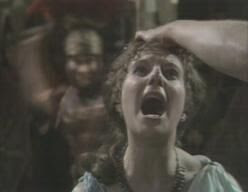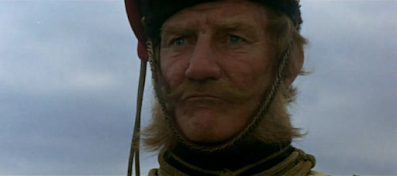Bradford has a long connection with filmmaking; indeed it was the first UNESCO City of Film in the world. And of course the very first moving pictures ever were taken next door in Leeds. So lots of films have been made in this part of the world. I previously mentioned 'Ilkley: the movie', which was eventually released as 'Say Your Prayers'. Now, I have never seen it, and nor do I know anyone who has, from which I think we can deduce both that it had a very limited release and that it's rubbish. However, given the chance I would watch it because, you know, it's local.
In the meantime I have been to see 'Ali & Ava', also shot in Bradford, but this time in the inner city. It's a nice, warm-hearted watch with all the conflict and difficulties resolving themselves, mostly off camera and in ways not clearly explained. I did enjoy it though, and the physical Bradford shown in it is very much the real Bradford. For those who don't know the city it is perched on hills surrounding a central valley (*) and most views are across the centre to another piece of high ground, and that's faithfully reproduced here. In case anyone wonders about the sudden appearance of an opulent bookshop among shots of gritty terraces and segregated housing estates, that's the Waterstones in the Wool Exchange, which is a lovely building. Wool of course was once the source of the city's wealth.
 |
| I bet Heathcliffe and Cathy didn't go to Keighley first |
Your bloggist is slowing down in his old age and therefore my companion was the same person that I went to see Belfast with recently. This new film contained such a glaring public transport solecism that I turned to her at the end expecting a tirade of "that would never happen". But with the contrariness of her sex, she shrugged her shoulders and said that she couldn't see anything wrong with it. So, it is left to me to point out that if one lived in central Bradford and wanted to go to Haworth for the weekend then one would just go there and not first head off in a different direction, stop at Keighley station and get on the KWVR.
 |
| Not the National Gallery |
And, while we're on the subject of public transport, like the proverbial bus a second film shot in Bradford has appeared immediately after the first one. 'The Duke' (**) is mostly set in Newcastle, but the terraced houses seen in the film are in Bradford and the scenes purporting to be the National Gallery in Trafalgar Square were actually shot in Cartwright Hall in Lister Park (***). I recommend the film, which is very entertaining, and there are excellent performances from Helen Mirren and especially Jim Broadbent, although they're both a decade too old for the roles they play. I said in yesterday's post about Macbeth that great acting doesn't require speech and Mirren proves that again. She manages to express her disapproval of her husband's behaviour simply by the way she knits. As H.L. Mencken astutely observed: "A man may be a fool and not know it; but not if he is married". The annoying error in 'The Duke' is class related rather than anything to do with transport. Helen Mirren lays the table for tea (and that is correct: tea not dinner) and puts the dessert spoon to the right of the knife. Wrong! In a working class home of the early sixties the spoon would have been placed across the top. Don't they do any research?
* The football ground is called Valley Parade for a reason. Unusually for this part of the world there is no river at the bottom of the valley. The road that runs along it is called Canal Road, but there's no canal either.
** This actually has a couple of tenuous wargaming connections, one of which is that the Duke in question is Wellington.
*** I was there a couple of weeks ago to see 'Island to Island', an exhibition of photographs of the West Indies. If you're in the area I recommend both it and the vegan chocolate cake in the café.
























